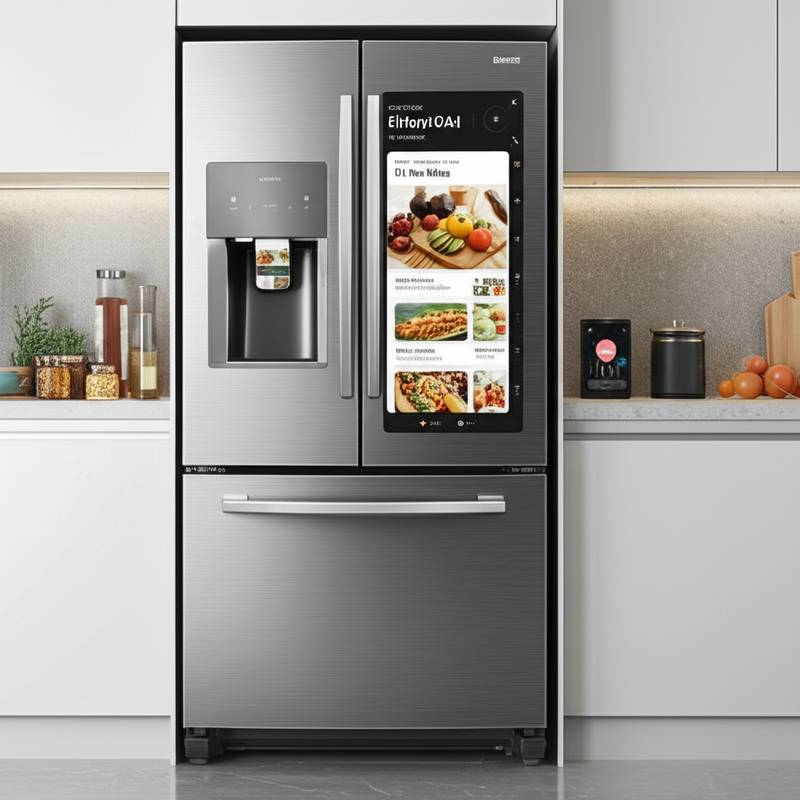AI Fridges Automatically Order Based on Meal Plans
Smart kitchens advance from basic convenience to genuine intelligence. The current development involves AI-powered refrigerators that perform beyond mere cooling. These appliances learn eating habits, monitor inventory, and place grocery orders automatically according to personalized meal plans. This capability, once considered futuristic, now serves as a practical tool for households seeking healthier diets, reduced waste, and simplified planning.
Smarter Shopping Without Manual Effort
Consider opening the refrigerator to view precise details on available ingredients, possible meals, and low-stock items. AI-driven grocery management delivers this functionality. Built-in cameras and tracking systems identify products, record expiration dates, and account for preferences. When supplies dwindle or items approach spoilage, the system updates the grocery list or forwards orders to preferred delivery services.
Such automation addresses a major time drain in daily life: monitoring purchases. Consumer surveys indicate that individuals dedicate hours weekly to meal planning and shopping. These smart refrigerators reduce that duration substantially while minimizing food waste via precise inventory control.
Personalized Meal Planning Receives Enhancement
Conventional meal planning applications depend on user-entered data, yet advanced smart refrigerators adopt a comprehensive integration method. The appliance links with health applications, dietary choices, and calendars to propose meals aligned with schedules and objectives. For a planned pasta evening, it verifies existing ingredients and procures any shortages.
Samsung Family Hub models and LG InstaView ThinQ units incorporate AI tools for meal suggestions derived from internal contents. These systems integrate with grocery delivery platforms to ensure missing components arrive promptly for preparation. This process merges ease with nutritional insight seamlessly.
Reducing Food Waste Through Accurate Monitoring
Food waste presents an increasing issue, and smart refrigerators provide effective remedies. By tracking expiration dates and prompting use of priority items, they prevent discard of viable food. Certain models issue alerts for recipes utilizing soon-to-expire ingredients. This approach conserves funds and fosters sustainable practices.
Reports from analysts show that households employing smart food management waste considerably less than those without. Predictive recommendations alter perspectives on storage and usage. Users anticipate needs rather than respond to shortages, benefiting from forward-thinking guidance.
Integration Within Smart Home Ecosystems
The true strength of these refrigerators lies in their connection to expansive smart home networks. They interact with virtual assistants, smart ovens, and grocery services. Upon meal plan approval, the refrigerator might initiate oven preheating or notify family members of cooking readiness. This linked setup converts meal preparation into an orchestrated sequence instead of disjointed activities.
Device interoperability represents a standard expectation. Users desire appliances that communicate and deliver cohesive functionality. Emerging standards such as Matter facilitate this compatibility across brands, enabling cooperation among refrigerators, lighting, and other devices.
Overcoming Challenges in Adoption
Innovations often face hurdles like expense and interoperability. Premium AI refrigerators maintain elevated costs, and integration with all grocery services remains incomplete. However, usage increases as prices decline and networks broaden. The benefits in ease and economy soon offset initial outlays for many.
Privacy and data protection warrant attention. These units gather details on consumption patterns and purchasing behaviors, prompting manufacturers to emphasize clarity and user oversight. Individuals typically control data sharing levels and feature activations.
Adopting an Intuitive Kitchen Routine
Incorporating an AI refrigerator alters more than shopping habits. It influences everyday patterns profoundly. Attention shifts from immediate shortages, such as milk depletion, to future culinary intentions. Families synchronize meals via shared digital schedules, while professionals depend on automatic replenishments to avoid urgent errands.
Future kitchens emphasize intuition over mere connectivity. They comprehend routines, adjust to nutritional needs, and handle responsibilities discreetly. Continued advancements in these refrigerators support enhanced decisions and streamlined lifestyles.
